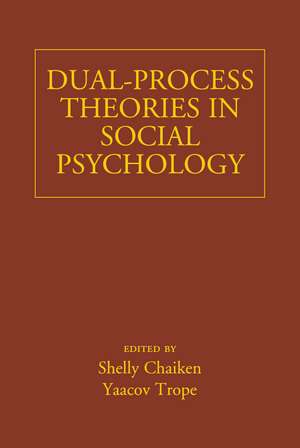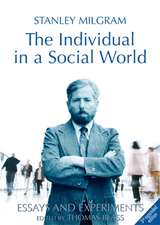Dual-Process Theories in Social Psychology
Editat de Shelly Chaiken, Yaacov Tropeen Limba Engleză Hardback – apr 1999
This informative volume presents the first comprehensive review of research and theory on dual-process models of social information processing. These models distinguish between qualitatively different modes of information processing in making decisions and solving problems (e.g., associative versus rule-based, controlled versus uncontrolled, and affective versus cognitive modes). Leading contributors review the basic assumptions of these approaches and review the ways they have been applied and tested in such areas as attitudes, stereotyping, person perception, memory, and judgment. Also examined are the relationships between different sets of processing modes, the factors that determine their utilization, and how they work in combination to affect responses to social information.
Preț: 702.40 lei
Preț vechi: 867.16 lei
-19% Nou
Puncte Express: 1054
Preț estimativ în valută:
134.40€ • 146.45$ • 113.26£
134.40€ • 146.45$ • 113.26£
Carte tipărită la comandă
Livrare economică 23 aprilie-07 mai
Livrare express 18-22 martie pentru 125.50 lei
Preluare comenzi: 021 569.72.76
Specificații
ISBN-13: 9781572304215
ISBN-10: 1572304219
Pagini: 657
Dimensiuni: 178 x 254 x 43 mm
Greutate: 1.32 kg
Ediția:New.
Editura: Guilford Publications
Colecția Guilford Press
ISBN-10: 1572304219
Pagini: 657
Dimensiuni: 178 x 254 x 43 mm
Greutate: 1.32 kg
Ediția:New.
Editura: Guilford Publications
Colecția Guilford Press
Public țintă
Professional Practice & DevelopmentCuprins
I. Overview
1. What the Mind's Not, Gilbert
2. The History of Dual-Process Notions, and the Future of Preconscious Control, Moskowitz, Skurnik, and Galinsky
II. Dual-Process Theories in Attitudes and Social Cognition, and Single-Process Countermodels
A. Attitudes (and Beyond)
3. The Elaboration Likelihood Model: Current Status and Controversies, Petty and Wegener
4. The Heuristic-Systematic Model in Its Broader Context, Chen and Chaiken
5. The MODE Model of Attitude-Behavior Processes, Fazio and Towles-Schwen
6. Depth of Processing, Belief Congruence, and Attitude-Behavior Correspondence, Ajzen and Sexton
B. Person Perception
7. Spontaneous versus Intentional Inferences in Impression Formation, Uleman
8. A Dual-Process Model of Overconfident Attributional Inferences, Trope and Gaunt
9. Modes of Social Thought: Theories and Social Understanding, Levy, Plaks, and Dweck
10. Dual-Processing Accounts of Inconsistencies in Responses to General versus Specific Cases, Sherman, Beike, and Ryalls
C. Stereotyping in Particular
11. The Continuum Model: Ten Years Later, Fiske, Lin, and Neuberg
12. Dual Processes in the Cognitive Representation of Persons and Social Categories, Brewer and Harasty
13. On the Dialectics of Discrimination: Dual Processes in Social Stereotyping, Bodenhausen, Macrae, and Sherman
D. One or Two Processing Modes in Social Cognition?
14. Separate or Equal?: Bimodal Notions of Persuasion and a Single-Process Unimodel, Kruglanski, Thompson, and Spiegel
15. Parallel Processing of Stereotypes and Behaviors, Kunda
16. Associative and Rule-Based Processing: A Connectionist Interpretation of Dual-Process Models, Smith and DeCoster
III. Issues of Cognition Control in Processing and Judgment
17. Automaticity and Control in Stereotyping, Devine and Monteith
18. The Cognitive Monster: The Case against the Controllability of Automatic Stereotype Effects, Bargh
19. The Role of Cognitive Control: Early Selection versus Late Correction, Jacoby, Kelley, and McElree
IV. Issues of Affect and Self-Regulation in Dual-Process Theories
20. Deliberative versus Implemental Mindsets in the Control of Action, Gollwitzer and Bayer
21. Sufficient and Necessary Conditions in Dual-Process Models: The Case of Mood and Information Processing, Bless and Schwarz
22. Affect in Attitude: Immediate and Deliberative Perspectives, Giner-Sorolla
23. Some Basic Issues Regarding Dual-Process Theories from the Perspective of Cognitive-Experiential Self-Theory, Epstein and Pacini
24. Processes Underlying Metacognitive Judgments: Information-Based and Experience-Based Monitoring of One's Own Knowledge, Koriat and Levy-Sadot
25. Promotion and Prevention as motivational Duality: Implications for Evaluative Processes, Higgins
V. Applications and Extensions of Dual-Process Theorizing
26. Exploring the Boundary between Fiction and Reality, Prentice and Gerrig
27. Motives and Modes of Processing in the Social Influence of Groups, Wood
28. The Social Contingency Model: Identifying Empirical and Normative Boundary Conditions on the Error-and-Bias Portrait of Human Nature, Tetlock and Lerner
29. On the Relationship between Social and Cognitive Modes of Organization, Baron and Misovich
30. Dualities and Continua: Implications for Understanding Perceptions of Persons and Groups, Hamilton, Sherman, and Maddox
31. When Do Decent People Blame Victims?: The Differing Effects of the Explicit/Rational and Implicit/Experiential Cognitive Systems, Lerner and Goldberg
1. What the Mind's Not, Gilbert
2. The History of Dual-Process Notions, and the Future of Preconscious Control, Moskowitz, Skurnik, and Galinsky
II. Dual-Process Theories in Attitudes and Social Cognition, and Single-Process Countermodels
A. Attitudes (and Beyond)
3. The Elaboration Likelihood Model: Current Status and Controversies, Petty and Wegener
4. The Heuristic-Systematic Model in Its Broader Context, Chen and Chaiken
5. The MODE Model of Attitude-Behavior Processes, Fazio and Towles-Schwen
6. Depth of Processing, Belief Congruence, and Attitude-Behavior Correspondence, Ajzen and Sexton
B. Person Perception
7. Spontaneous versus Intentional Inferences in Impression Formation, Uleman
8. A Dual-Process Model of Overconfident Attributional Inferences, Trope and Gaunt
9. Modes of Social Thought: Theories and Social Understanding, Levy, Plaks, and Dweck
10. Dual-Processing Accounts of Inconsistencies in Responses to General versus Specific Cases, Sherman, Beike, and Ryalls
C. Stereotyping in Particular
11. The Continuum Model: Ten Years Later, Fiske, Lin, and Neuberg
12. Dual Processes in the Cognitive Representation of Persons and Social Categories, Brewer and Harasty
13. On the Dialectics of Discrimination: Dual Processes in Social Stereotyping, Bodenhausen, Macrae, and Sherman
D. One or Two Processing Modes in Social Cognition?
14. Separate or Equal?: Bimodal Notions of Persuasion and a Single-Process Unimodel, Kruglanski, Thompson, and Spiegel
15. Parallel Processing of Stereotypes and Behaviors, Kunda
16. Associative and Rule-Based Processing: A Connectionist Interpretation of Dual-Process Models, Smith and DeCoster
III. Issues of Cognition Control in Processing and Judgment
17. Automaticity and Control in Stereotyping, Devine and Monteith
18. The Cognitive Monster: The Case against the Controllability of Automatic Stereotype Effects, Bargh
19. The Role of Cognitive Control: Early Selection versus Late Correction, Jacoby, Kelley, and McElree
IV. Issues of Affect and Self-Regulation in Dual-Process Theories
20. Deliberative versus Implemental Mindsets in the Control of Action, Gollwitzer and Bayer
21. Sufficient and Necessary Conditions in Dual-Process Models: The Case of Mood and Information Processing, Bless and Schwarz
22. Affect in Attitude: Immediate and Deliberative Perspectives, Giner-Sorolla
23. Some Basic Issues Regarding Dual-Process Theories from the Perspective of Cognitive-Experiential Self-Theory, Epstein and Pacini
24. Processes Underlying Metacognitive Judgments: Information-Based and Experience-Based Monitoring of One's Own Knowledge, Koriat and Levy-Sadot
25. Promotion and Prevention as motivational Duality: Implications for Evaluative Processes, Higgins
V. Applications and Extensions of Dual-Process Theorizing
26. Exploring the Boundary between Fiction and Reality, Prentice and Gerrig
27. Motives and Modes of Processing in the Social Influence of Groups, Wood
28. The Social Contingency Model: Identifying Empirical and Normative Boundary Conditions on the Error-and-Bias Portrait of Human Nature, Tetlock and Lerner
29. On the Relationship between Social and Cognitive Modes of Organization, Baron and Misovich
30. Dualities and Continua: Implications for Understanding Perceptions of Persons and Groups, Hamilton, Sherman, and Maddox
31. When Do Decent People Blame Victims?: The Differing Effects of the Explicit/Rational and Implicit/Experiential Cognitive Systems, Lerner and Goldberg
Notă biografică
Shelly Chaiken, PhD, and Yaacov Trope, PhD, Department of Psychology, New York University, New York, NY
Recenzii
"This volume assembles leading researchers to provide in-depth discussions of a key theoretical construct in cognitive and social psychology. Researchers, graduate students, and advanced undergraduates have gained a valuable resource for understanding how dual process theories have been used to clarify our understanding of phenomena in many areas, including attitudes, person perception, stereotyping, cognitive control, and self-regulation. It is a luxury to have these thoughtful papers gathered together in one place." --Marcia K. Johnson, PhD, Professor, Psychology Department, Princeton University
"Understanding how human beings react to the social world has always been a central problem for psychology. Explanations in terms of learning theories or principles of rationality are rarely sufficient. This book contains brilliant accounts of the 'other' ways of looking at social behavior--as imitation, as forms of risk regulation, as conformity, as wish fulfillment. It will serve as an excellent guide and text." --Jerome Bruner, PhD, University Professor, Research Professor of Psychology, Senior Research Fellow in Law, New York University
-"Understanding how human beings react to the social world has always been a central problem for psychology. Explanations in terms of learning theories or principles of rationality are rarely sufficient. This book contains brilliant accounts of the 'other' ways of looking at social behavior--as imitation, as forms of risk regulation, as conformity, as wish fulfillment. It will serve as an excellent guide and text." --Jerome Bruner, PhD, University Professor, Research Professor of Psychology, Senior Research Fellow in Law, New York University
Descriere
This informative volume presents the first comprehensive review of research and theory on dual-process models of social information processing. Leading contributors review the basic assumptions of these approaches.









